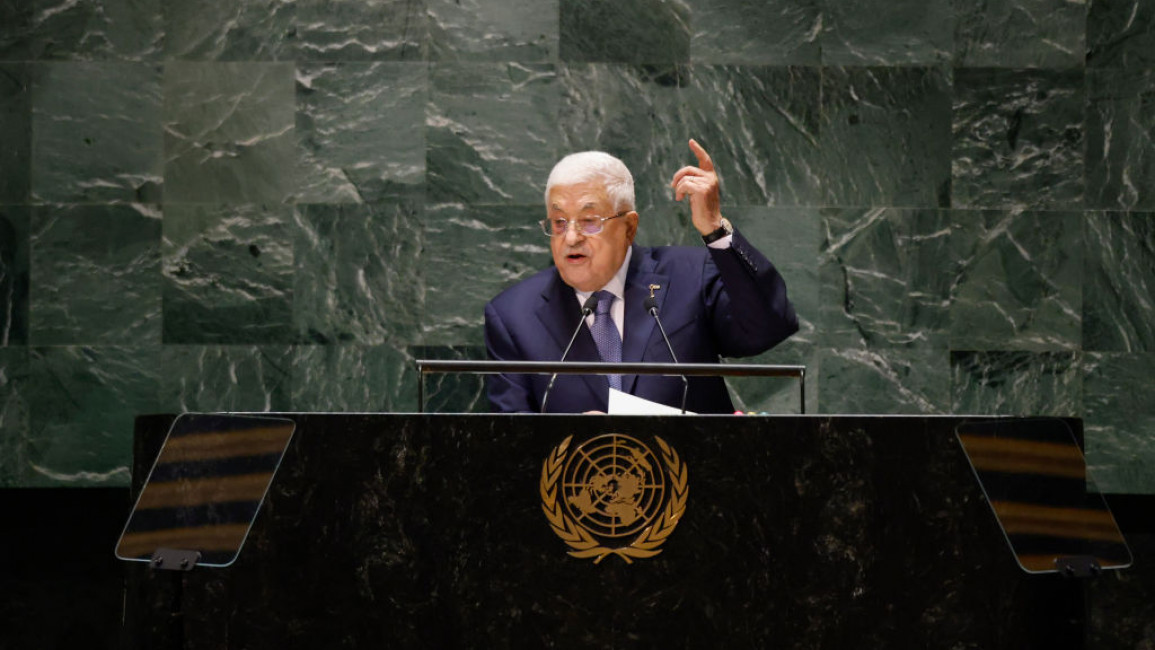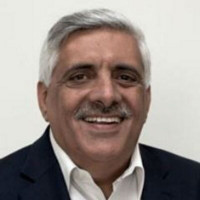
Abbas sticks to same UN script as Saudi normalisation looms
When Palestinian President Mahmoud Abbas addressed the 78th United Nations General Assembly last week, he once again employed his tried and tested talking points, calling for a two-state solution and Palestinian statehood as a requisite for peace in the Middle East.
Abbas mentioned the term ‘international’ 23 times, emphasising the need for international intervention and accountability to end the occupation.
“In light of the deadlock in the peace process due to Israel’s policies, we come before you to again appeal for the holding of an international peace conference, in which all countries concerned with achieving peace in the Middle East will participate,” he said.
Abbas zeroed in on Israel (mentioned 25 times), describing the occupying state as abhorrent, a “state above the law,” a state guilty of “illegal” actions, run by a “racist, right-wing settler government.”
"Abbas's speech was not much different from his previous interventions at the UN. Some say he is consistent and obstinate in his insistence on fighting for Palestinian rights, while others might want to see a more creative approach"
Abbas used the term “colonial” to describe the settlement enterprise, slammed the recent Israeli government of “obstructing” Palestinian participation in elections in Jerusalem and concluded that Israel was, “systematically destroying the two-state solution.”
The two-state solution was mentioned 14 times, with President Abbas chiding the international community for its hypocrisy by refusing to recognise Palestine while, “Israel enjoys this international recognition, though it has not adhered to the conditions for its accession to the United Nations.”
The Palestinian leader called for international protection of his people saying that the international community must, “implement the resolutions to provide protection for the Palestinian people…from the constant aggressions of the occupation army and the terrorist Israeli settlers.”
Responding to European and other countries' regular calls for the need for Palestinian elections to give legitimacy to the administration and government, Abbas mentioned the term elections seven times. He said that elections at the local and civil society level have taken place. “All that remains for us is to hold democratic general elections,” he said.
In the wake of Palestinian president Mahmoud Abbas’ speech at the @UN, where he reiterated the case for a two-state solution, @daoudkuttab argues that it is time for the US and other member states who support this plan to finally enact it ⬇
— The New Arab (@The_NewArab) October 2, 2022
#UNGA https://t.co/nAsdvKiUKy
However, the Palestinian leader placed the blame for the absence of general elections on the Israelis, who had previously allowed Jerusalemites to participate.“The Israeli government is obstructing this by its decision to prevent elections from being held in East Jerusalem,” he said.
Abbas mentioned Jerusalem six times and focused on the assaults on religious sites, saying Israel is, “violating the City of Jerusalem and its people, assaulting our Islamic and Christian sacred sites, and violating the historical and legal status of the holy sites.”
The elder Palestinian said he has had a hard time trying to figure out why the international community speaks constantly about the two-state solution yet refuses to accept both parts of that statement.
“I can neither understand, nor accept, that some States, including America and European States, are reluctant to recognize the State of Palestine.”
Mahmoud Abbas ended his speech with a question: What is the danger posed by the State of Palestine obtaining full membership in the United Nations?
Indeed, the fact is clear that there is no danger in Palestine becoming a full member state in the United Nations, even under occupation. Member state status would change the entire negotiation dynamic.
Instead of the status of the Palestinian occupied territories continuing to be in doubt, a full Palestine member state will pave the way for talks of a peace agreement between two states rather than one powerful state and a people under occupation.
Palestinian president has once again placed the onus on the international community, which had initially allowed for the existence of the state of Israel on Palestinian land within demarcated borders.
Saudi Crown Prince #MBS gave a rare interview this week in which he said that Saudi's normalisation deal with Israel is getting “closer.”
— The New Arab (@The_NewArab) September 22, 2023
He also said that if Iran were to acquire nuclear weapons, then so would #SaudiArabia
Video produced by @alexander_durie ⬇️ pic.twitter.com/evHhjgkb57
The UN’s recognition of the state of Israel was predicated on a commitment Israel made toward the right of return of Palestinian refugees, on which they have completely abandoned. In fact, it would be more accurate to say they never had any intention of allowing Palestinians back to their homelands.
This has become a familiar pattern: the international community makes concessions and exceptions for Israel on the basis of promises Israel never intends to keep.
Case and point is the Oslo Accords, with their vague text on the status of Palestine. From the beginning, the Israeli regime had no intention of accepting Palestinian statehood and the best proof of that has been illegal colonial settlements and settlers, who have tripled in number since the Oslo Accords were signed thirty years ago.
Abbas’s speech was not much different from his previous interventions at the UN. Some say he is consistent and obstinate in his insistence on fighting for Palestinian rights, while others might want to see a more creative approach.
"Will the Saudi Crown Prince allow for a free gift to the racist Israeli government without any Israeli response to Palestinian national demands?"
Abbas is not an orator and his improvisations when speaking outside the script have landed him in trouble. He made no gaffe in his UN speech, but it is not clear if he has broken any new ground or won over any new allies.
The elephant in the room continues to be Saudi Crown Prince Mohammad Bin Salman and his regional political ambitions. How serious will he be in protecting Palestinian rights, as he said publicly, given that a Saudi-Israel normalisation deal is closer than ever?
Will the Saudi Crown Prince allow for a free gift to the racist Israeli government without any Israeli response to Palestinian national demands?
Abbas’s obstinate defence of inalienable Palestinian rights is seen as a conditional sign of support to the Saudi government, which has thus far refused to accept any US-led deal for normalisation without a parallel serious effort at ending the occupation and granting Palestinian rights of freedom and independence.
Daoud Kuttab is an award-winning Palestinian journalist from Jerusalem. He is a former Ferris Professor of Journalism at Princeton University.
Follow him on Twitter: @daoudkuttab and Threads: @daoud.kuttab
Have questions or comments? Email us at: editorial-english@newarab.com
Opinions expressed in this article remain those of the author and do not necessarily represent those of The New Arab, its editorial board or staff.




